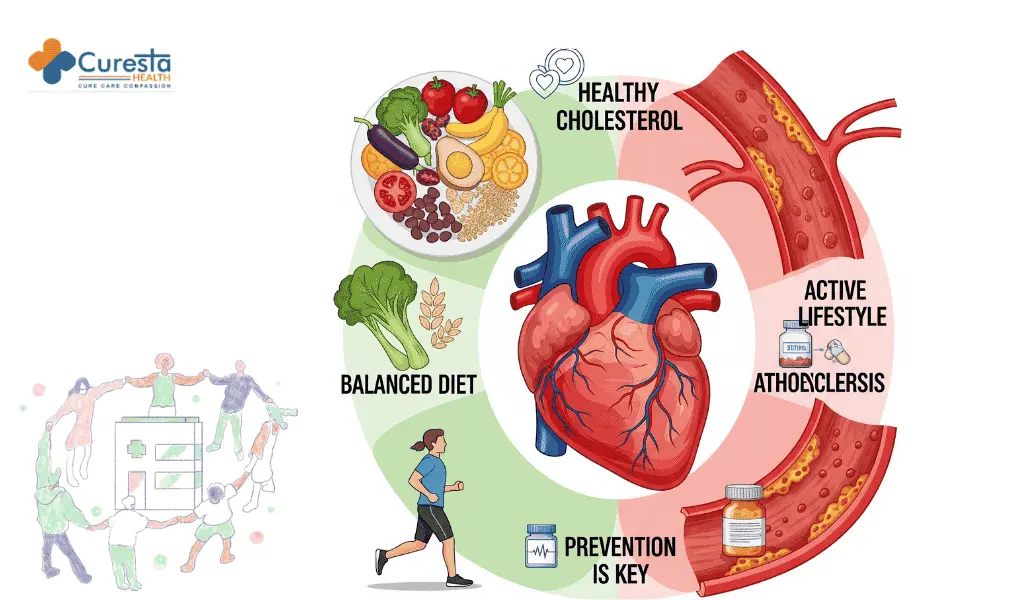



High cholesterol and elevated triglycerides are primary risk factors for heart disease and stroke. But managing cholesterol is not just about medication. It is about understanding the different types of cholesterol and making lifestyle changes that truly support your heart.
In this blog, we will break down what LDL and HDL cholesterol really mean, why triglycerides matter, and how you can naturally keep your numbers in check with diet, exercise, and holistic therapies.
Cholesterol is a waxy substance found in your blood that your body requires to build cells and produce hormones. But too much of the wrong kind can cause trouble. LDL or low-density lipoprotein is often called the bad cholesterol, which leads to plaque buildup in your arteries, elevating the risk of heart attacks.
HDL, or high-density lipoprotein, is called the good cholesterol that helps remove LDL from your bloodstream, protecting your heart. Triglycerides are a type of fat in your blood, and when they are too high, they add to your risk for heart disease and stroke.
Several factors can raise your LDL cholesterol and triglycerides, such as:
Consumption of too much saturated fat, trans fats, and refined sugars found in processed foods.
Lack of physical activity leads to weight gain and poor lipid levels.
Obesity, particularly excess belly fat, is linked to higher triglycerides and lower HDL.
Obesity, particularly excess belly fat, is linked to higher triglycerides and lower HDL.
Genetics may also play a role, such as in familial hypercholesterolemia.
Other health conditions like diabetes and hypothyroidism can affect your cholesterol levels.
Cholesterol problems rarely cause symptoms. Most people discover high cholesterol through a blood test. However, long-term high cholesterol can lead to heart disease, which may cause chest pain, shortness of breath, or stroke symptoms like sudden numbness or confusion. Regular screenings are essential, especially if you have a family history or other risk factors.
Eat a heart-healthy diet, increasing fibre-rich foods like fruits, vegetables, and whole grains. Include healthy fats like those found in avocados, nuts, and olive oil. Exercise regularly, aiming for at least thirty minutes of moderate aerobic exercise most days to boost HDL and lower LDL and triglycerides. Maintaining a healthy weight, even losing five to 10% of your body weight, improves cholesterol levels.
Stop smoking and limit alcohol, as both negatively affect your cholesterol and triglyceride levels. Consider natural supplements like garlic, omega-3 fatty acids, and hibiscus tea, but always discuss with your doctor.
If lifestyle changes are insufficient, doctors may prescribe:
Statins to lower LDL
PCSK9 inhibitors for additional LDL reduction
Fibrates or niacin to reduce triglycerides and raise HDL
Medications work best alongside ongoing lifestyle improvements.
Taking charge of cholesterol entails more than a one-off diet or prescription, but it’s a lifelong, holistic commitment. Regular exercise, balanced nutrition, weight management and quitting tobacco form the foundation. Combine these with evidence-based supplements and periodic medical reviews, and you can dramatically lower LDL, raise HDL, tame triglycerides and safeguard your heart against premature disease.
Get personalised, lifestyle-focused cardiac care at Curesta Health’s state-of-the-art facilities. Our multidisciplinary team combines advanced diagnostics with tailored guidance on nutrition, exercise and stress management to create a plan built around you. Put your heart first, book your consultation today.
What is the difference between LDL and HDL cholesterol?
LDL is the bad cholesterol that can clog arteries. HDL is the good cholesterol that helps clear LDL from the bloodstream.
Can cholesterol be managed naturally?
Yes, through diet, exercise, and weight management, many people successfully manage cholesterol naturally.
What foods should I avoid to lower cholesterol?
Avoid foods high in saturated fats, trans fats, and refined sugar, such as fried foods, processed snacks, and fatty meats.
What causes elevated triglycerides?
High sugar intake, obesity, inactivity, and certain medical conditions can raise triglyceride levels.
How often should I check my cholesterol?
Adults should have their cholesterol checked at least every four to 6 years, more frequently if at risk or undergoing treatment.